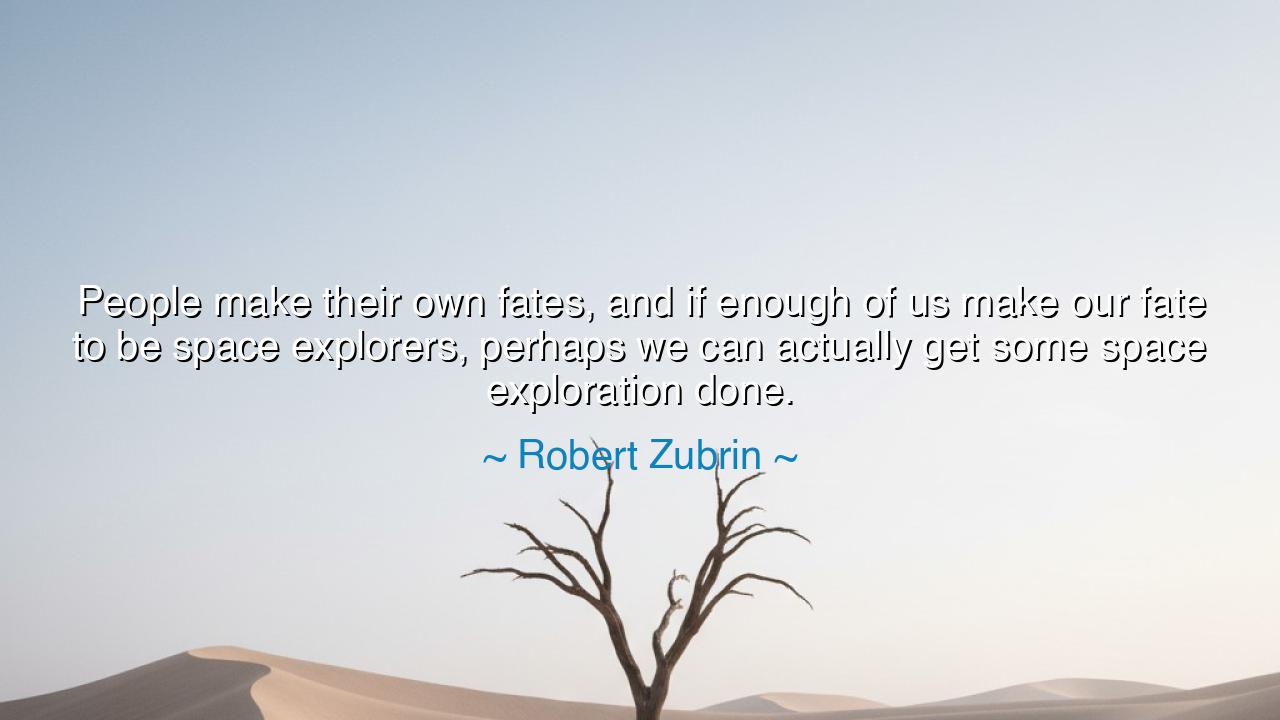
People make their own fates, and if enough of us make our fate to
People make their own fates, and if enough of us make our fate to be space explorers, perhaps we can actually get some space exploration done.






In the tapestry of human history, there is one truth that resounds through the ages: fate is not a force that controls us, but something we shape with every choice we make. Robert Zubrin encapsulates this profound reality when he declares, "People make their own fates, and if enough of us make our fate to be space explorers, perhaps we can actually get some space exploration done." These words remind us that the destiny of humankind is not written in the stars, but forged by the collective will of those who dare to reach for them. Zubrin calls upon us to embrace our potential, to create the future we wish to see, rather than wait for it to unfold by chance.
The ancients believed deeply in the power of human agency. The great Greek philosophers argued that we are not mere vessels drifting through life, but active participants in shaping our own path. Socrates, for instance, believed that wisdom was not just about understanding the world but about choosing how to live within it. The Romans, too, saw their empire as the result of the strength of their people, their will, and their decisions. They did not believe that their fate was sealed by the gods; rather, they believed that virtue and action determined their destiny. In this, Zubrin echoes the eternal wisdom of the ancients: that we are creators of our own fate, not mere recipients of a destiny handed down to us by fate or chance.
To understand the power of choice, one need only look at the stories of the explorers of the past. Think of Christopher Columbus, who, in the late 15th century, set sail across the vast, uncharted ocean with a belief that the world was larger than he had been told, and that new lands lay beyond the horizon. Columbus did not wait for the world to reveal its secrets; he created his own path, driven by a vision that was beyond the conventional understanding of his time. His voyage marked the beginning of a new chapter in history, one where the unknown was no longer a barrier but a challenge to be embraced. Columbus, like Zubrin, understood that human agency, not fate, is the force that drives progress.
Similarly, the moon landing of 1969 marked another monumental moment in human history, one that exemplified the power of collective will to shape the course of humanity. The Apollo 11 mission, led by Neil Armstrong, Buzz Aldrin, and Michael Collins, was not merely a triumph of technology—it was a triumph of human determination. The dream of space travel, once considered an impossible fantasy, became a reality because a group of people dared to shape their fate. The space race was not about waiting for the universe to offer its secrets; it was about setting out boldly, with conviction and vision, to explore the unknown.
However, even as we look to the stars, the truth that Zubrin shares is still applicable today: fate is not determined by the exploration of space alone, but by the choices we make as individuals and as a society. We must actively choose to pursue the challenge of space exploration, and not simply expect it to unfold on its own. Zubrin’s call is a reminder that the space program, like any great enterprise, depends on the collective will and effort of a people united in a common vision. Just as the ancient Greeks and Romans looked to the horizon and saw opportunity, so too must we, the modern descendants of those visionaries, look outward to the stars and decide that exploration, rather than fear or doubt, will guide our future.
As we stand on the precipice of this new era, we must ask ourselves: How will we shape the future? How will we define our fate? The path to space exploration is not one that will be handed to us. It is a road that must be forged through dedication, perseverance, and a collective commitment to reaching beyond the limitations of what is known. The great lessons of history—the achievements of Columbus, the Apollo astronauts, and the philosophers of old—show us that the power to change our future lies in our hands.
Therefore, let us not wait for fate to decide for us. Let us choose, as individuals and as a people, to shape our destiny, just as those before us did. Space exploration is not just the work of astronauts and scientists; it is the work of all of us, the dreamers, the doers, the visionaries, and the ones who dare to believe that the universe is not a barrier, but a canvas awaiting our touch. Just as we have shaped the past, so too can we shape the future. Let us dream, let us act, and let us make our fate a journey to the stars.






AAdministratorAdministrator
Welcome, honored guests. Please leave a comment, we will respond soon